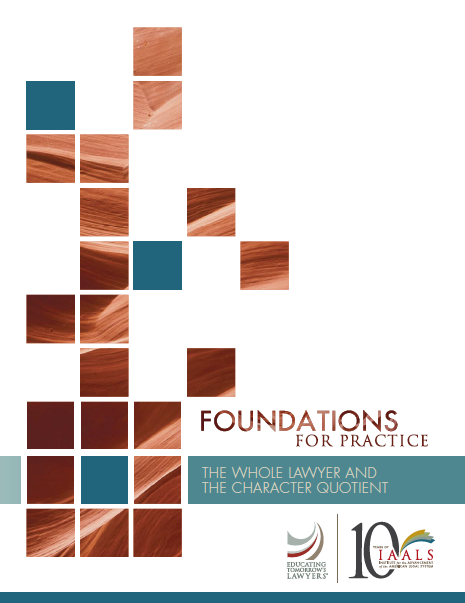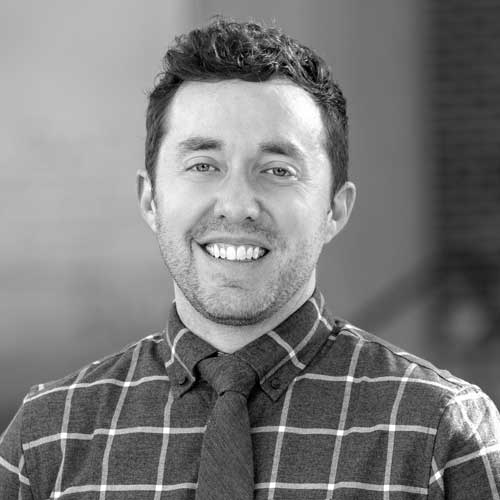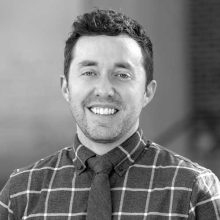Foundations for Practice: IAALS Asks What Makes a New Lawyer Successful
Most Comprehensive Study of Its Kind Closes Gap Between Legal Education and Legal Employment
 Today, aspiring lawyers across the country will sit for a bar examination that is intended to test their preparation for practice and will determine whether they will join the ranks of the legal profession this fall. While the bar examination has long been the measurement of what law graduates need in order to enter the profession, the profession and legal employers have nonetheless questioned its efficacy and the efficacy of legal education as a whole in actually preparing new lawyers. Many believe that American law schools are graduating lawyers unprepared to meet the demands of modern practice. Yet knowing what new lawyers need to succeed, and how they can acquire it effectively, was elusive until now.
Today, aspiring lawyers across the country will sit for a bar examination that is intended to test their preparation for practice and will determine whether they will join the ranks of the legal profession this fall. While the bar examination has long been the measurement of what law graduates need in order to enter the profession, the profession and legal employers have nonetheless questioned its efficacy and the efficacy of legal education as a whole in actually preparing new lawyers. Many believe that American law schools are graduating lawyers unprepared to meet the demands of modern practice. Yet knowing what new lawyers need to succeed, and how they can acquire it effectively, was elusive until now.
 In a first-of-its kind project, Educating Tomorrow’s Lawyers, an initiative of IAALS, the Institute for the Advancement of the American Legal System, reveals the keys to success: first, lawyers must have a high “character quotient.” Integrity, work ethic, grit, and common sense are just a few of the necessary characteristics. Second, according to IAALS’ report, Foundations for Practice: The Whole Lawyer and the Character Quotient, findings show that, while character reigns, being a successful lawyer requires a blend of character quotient with professional competencies and legal skills.
In a first-of-its kind project, Educating Tomorrow’s Lawyers, an initiative of IAALS, the Institute for the Advancement of the American Legal System, reveals the keys to success: first, lawyers must have a high “character quotient.” Integrity, work ethic, grit, and common sense are just a few of the necessary characteristics. Second, according to IAALS’ report, Foundations for Practice: The Whole Lawyer and the Character Quotient, findings show that, while character reigns, being a successful lawyer requires a blend of character quotient with professional competencies and legal skills.
“Just as the medical profession realized that ‘bedside manner’ matters in a doctor, IAALS’ research reveals that being a ‘whole lawyer’ means possessing a high character quotient in addition to having skills and intellect,” explained Alli Gerkman, Director of Educating Tomorrow’s Lawyers. “Our findings in this study have the power to radically shift the discussion about what law schools teach and how employers hire and motivate a different approach to educating, training, and employing America’s next generation of lawyers.”
 IAALS asked and more than 24,000 lawyers (across practice setting, specialty, and geography and in all 50 states) rated the collective foundations (legal skills, professional competencies, and characteristics) that entry-level lawyers need to succeed on day one as well as what should be acquired over time. With support from The William and Flora Hewlett Foundation and Access Group, and in partnership with state bar organizations, IAALS administered a survey and a collected a treasure trove of data that tell countless stories. All of the data is publicly available through the Project’s website.
IAALS asked and more than 24,000 lawyers (across practice setting, specialty, and geography and in all 50 states) rated the collective foundations (legal skills, professional competencies, and characteristics) that entry-level lawyers need to succeed on day one as well as what should be acquired over time. With support from The William and Flora Hewlett Foundation and Access Group, and in partnership with state bar organizations, IAALS administered a survey and a collected a treasure trove of data that tell countless stories. All of the data is publicly available through the Project’s website.
“People have been opining for years about what lawyers do and don’t need coming out of law school, but this is the first study to examine the question comprehensively,” said Larry Kramer, President of The William and Flora Hewlett Foundation and former Law Professor and Dean of Stanford Law School. “There is something in the results to surprise everyone—and an overall view that will and should help productively reset the debate about legal education.”
With almost 40% of the 2015 law school graduates unable to land full-time jobs requiring a law license, and only 23% of practicing lawyers believing new graduates have the right skills to enter the profession, the employment gap is clear. This has serious consequences on job seekers as well as firms, companies, and communities unable to meet their legal and leadership needs. IAALS’ Educating Tomorrow’s Lawyers Initiative launched the Foundations for Practice project with the goal of closing the gap between school and career; between credentials and capabilities; and between thinking like a lawyer and becoming one.
"IAALS’ findings do more than give law schools a roadmap for how to prepare lawyers. They also have the power to help legal employers identify better ways to hire new lawyers who will be strong fits in their organizations,” said lawyer Rew Goodenow, with Parsons Behle & Latimer and who served as president of the National Conference of Bar Presidents. “If schools and employers use these findings to their greatest potential, it will transform the profession for the better.”
Nationwide, law schools are now talking about what the learning outcomes should be and how to develop and measure them. Legal employers are likewise discussing how to turn those outcomes into tangible hiring criteria and revising their hiring practices accordingly. The data from the Foundations for Practice project will be the focus of a highly-interactive conference this September at IAALS, addressing how to gain richer insight into the survey results.
“The findings of this study paint an importantly nuanced and holistic picture of what it means to be a lawyer,” commented Patricia D. White, Dean and Professor of Law at the University of Miami School of Law. “There is much that all law schools can learn from this data as we work together with the profession to further bridge theory and practice.”




